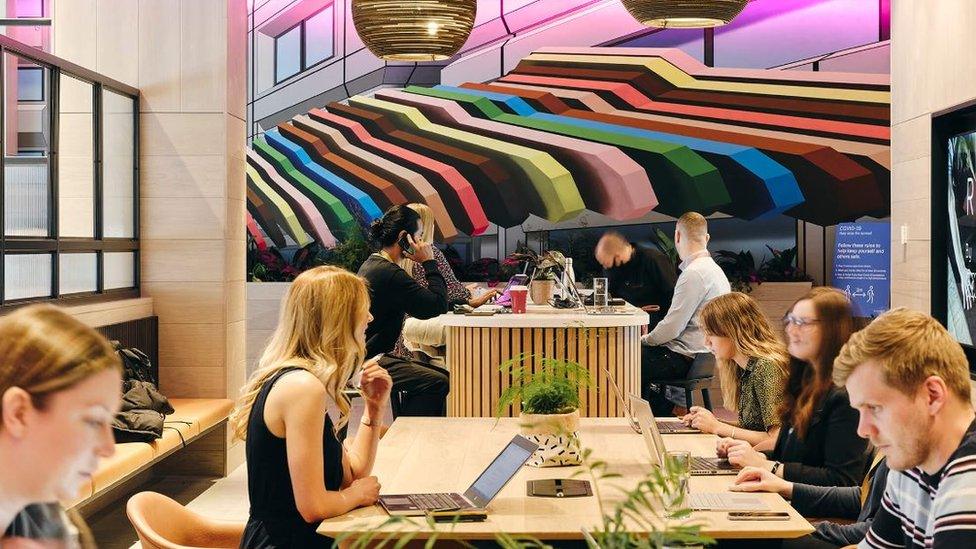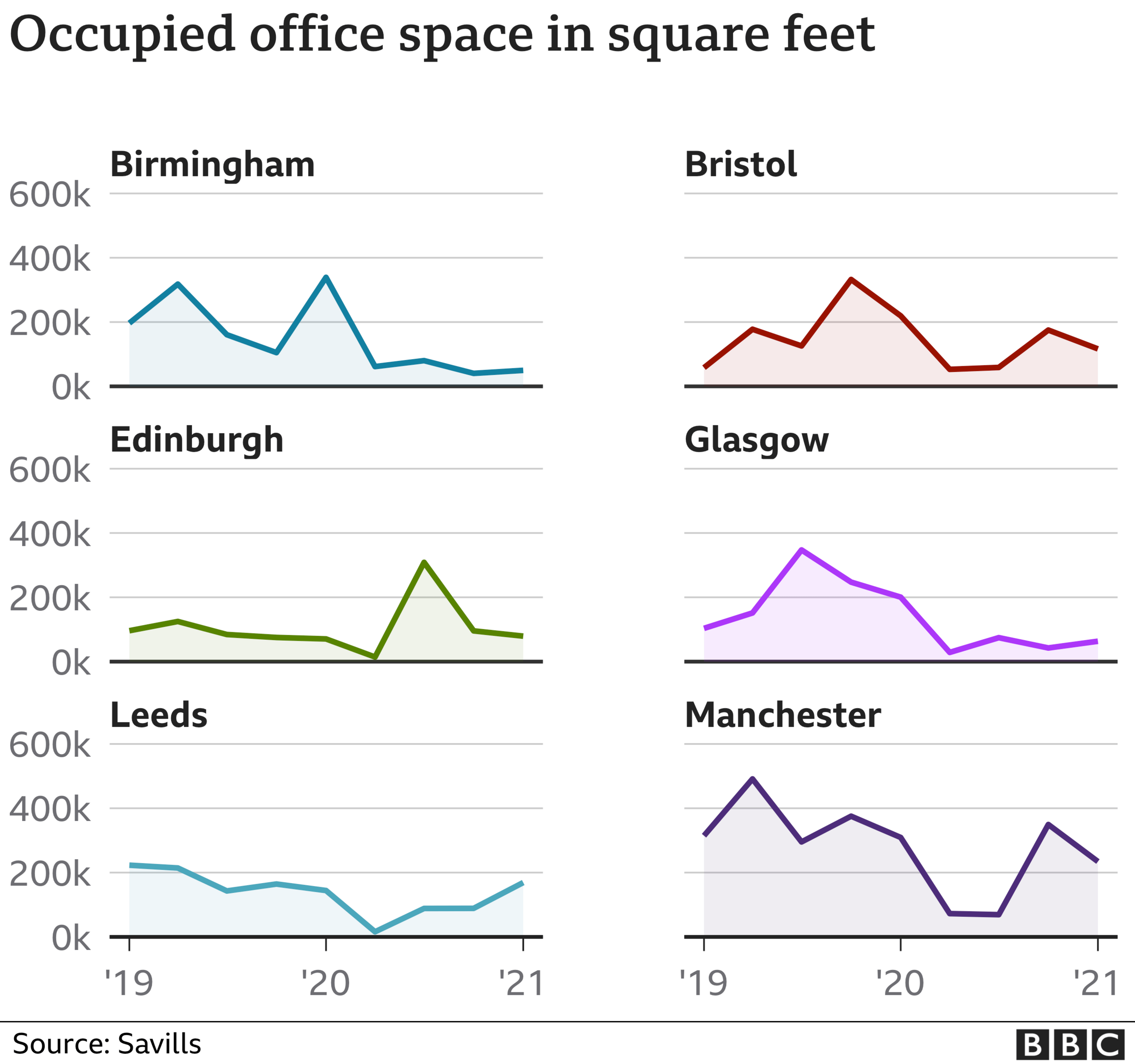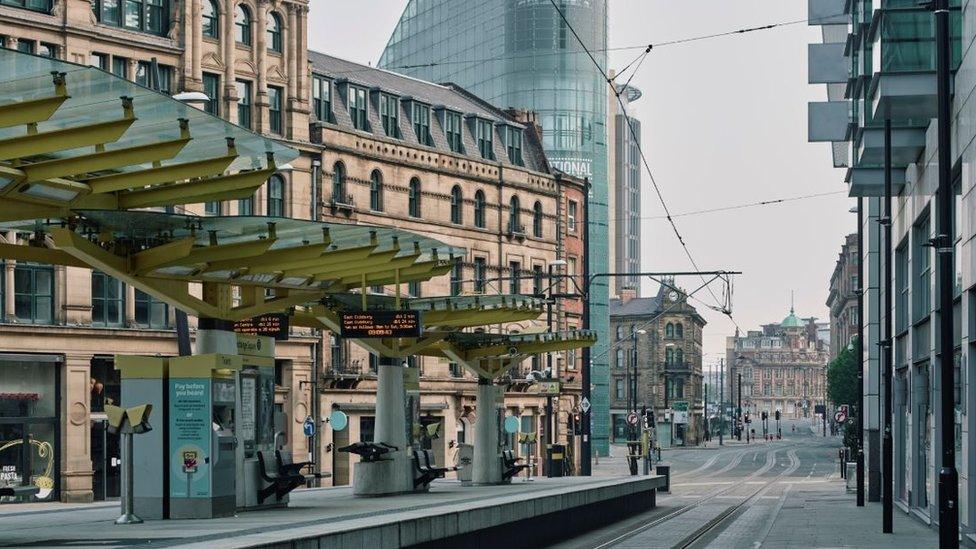'Five-day office week will become the norm again'
- Published
- comments

Jessica Bowles said firms wanted more flexible spaces and shorter leases, but most still wanted a five-day office
The five-day office week could become the norm again within two years, the Centre for Cities think tank has told the BBC.
A blend of home and office work is expected to be popular while the UK recovers from the pandemic.
But some analysts then anticipate a shift back to pre-Covid working patterns for many.
Currently, people who can work from home are still advised to do so.
However, that is likely to change if the government ends all social distancing restrictions on 21 June.
"I expect we will see three or four days a week in the office as the UK recovers," Paul Swinney, director of policy and research at Centre for Cities, told Radio 5 Live's Wake Up to Money programme.
"Over the longer term, I'm quite hopeful that we will see people return five days a week.
"The reason for that is, one of the benefits of being in the office is having interactions with other people, coming up with new ideas and sharing information."
He said people could not do this by scheduling a three o'clock meeting on a Tuesday - it had to happen randomly.
"If you're in the office on a Monday but someone else is in the office on a Wednesday, then you're starting to miss out. Or, if your colleague is in the office and having a meeting with your boss and you're not there, all of a sudden that changes the dynamic again."
Office for National Statistics data published in May, external revealed most people did not work from home in 2020, however the proportion of workers who did more than doubled during the pandemic. That hit the office property market while prompting lots of discussion about the future of the workplace.
Demand for more city centre office space does now appear to be rising - albeit from a very low point.
Figures from Savills estate agency show office take-up by square footage in the UK's six biggest regional cities has gone up significantly since the second quarter of 2020, the start of the pandemic.
The estate agency said it was also seeing "record rents" for some top tier office space in Greater London and regional city areas.

Sectors signing some of the biggest regional office deals were public services, education and health.
Office providers have struggled during the pandemic. On Monday, the shared office firm IWG warned of a sharp profits drop.
Nevertheless, the company said it was seeing "unprecedented demand" for its flexible office services as many more businesses adopted hybrid working.
'Most firms want a five-day office'
Jessica Bowles, director of strategy at commercial property developer Bruntwood, which operates in Manchester, Birmingham, Leeds and Liverpool, told the BBC her firm has also seen a lot of demand for flexible and serviced office space on short leases.
"We've had really strong take-up. People want flexible terms.
"What's interesting is that it's corporates wanting to do that as well as small businesses and SMEs."

Figures show a gradual rise in office space take-up in major UK cities, including Manchester
But hybrid working does not mean flexible office space leases are any cheaper as "flexibility is priced in". Most firms also want to keep a five-day office, she said.
"Most businesses that have got space with us now want to maintain having an office, and they don't see that they could give up the office for a certain number of days a week - they just want to use the space differently.
"That means more collaborative space, fewer banks of desks, places where people can come together and create and innovate."
She added that while hybrid working was growing in popularity before Covid-19 struck, the working pattern could be "challenging" for firms if some staff were at home, while some were in the office.

James Morris and his sister Naomi started their business before the pandemic to serve Birmingham commuters
"I think from a personal, and a business level, we'll see more people seeing the value in coming together to collaborate. But Fridays are always pretty quiet in the office and I don't expect that to change."
Ready to welcome commuters
Businesses reliant on office worker trade are hopeful their fortunes will soon improve.
In Birmingham, cafe owners and siblings James and Naomi Morris are looking forward to the arrival of more commuters to the city centre. They set up their business, Morridge, in 2019 specifically to target city workers.
James told the BBC he'd started to see more commuters coming into the cafe again.
"Over the past few weeks, office workers have slowly been returning. People are starting to work in the cafe - a lady came in for breakfast the other day and took a couple of work calls.
"Wednesdays and Thursdays are our busiest days."
He said he is expecting more workers to return to the city centre later in the month if the remaining Covid restrictions are lifted on 21 June, and said his customers had told him they expected more of their colleagues to return in September.
"It's looking good. I think it will all come back around."
But the prospect of a post-Covid mass return to the office - on even a hybrid basis - will not necessarily be universally welcomed by employees.
Staff at Apple reportedly launched a campaign to push back against boss Tim Cook's plans for workers to be in the office at least three days a week by September.
Data visualization by Daniele Palumbo
Related topics
- Published6 April 2021

- Published31 January 2022
